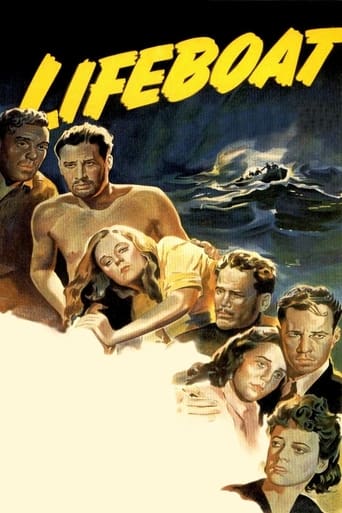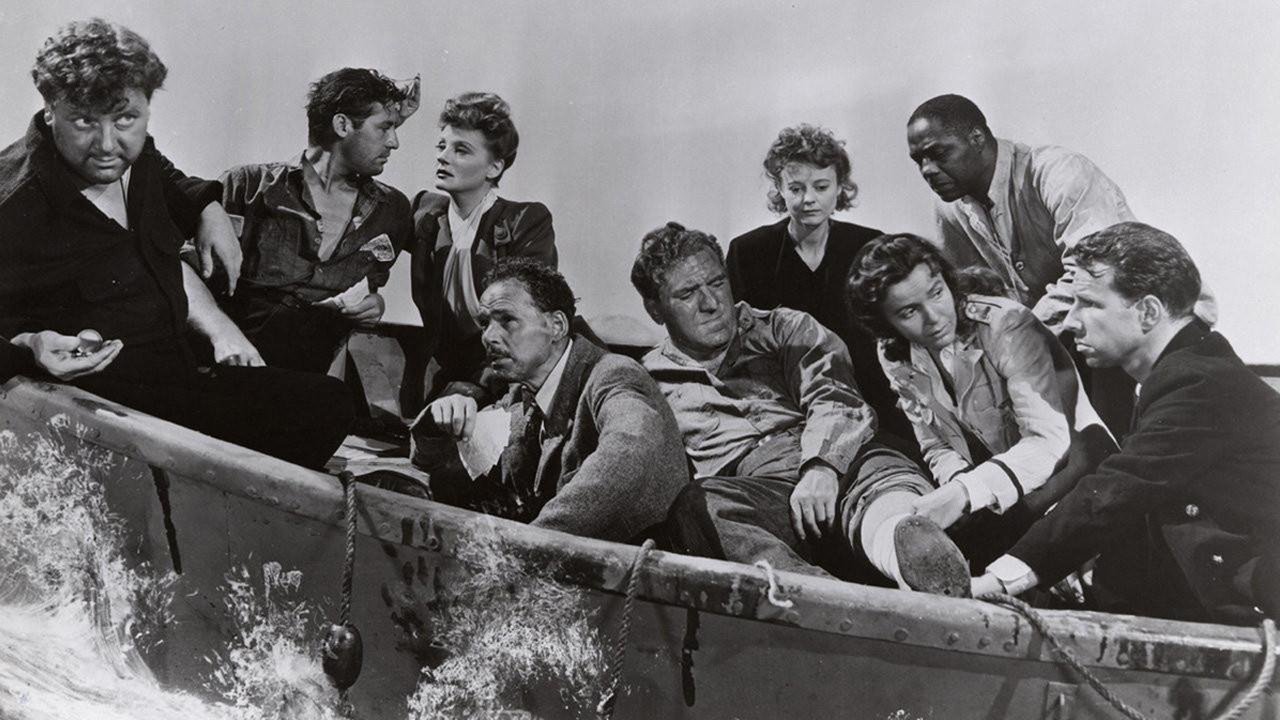robert-temple-1
This is one of the disappointing Hitchcock films. It is not that it is bad, it is just that it is not particularly good. It proudly proclaims that it was written by the then famous American author John Steinbeck. However, several other fingers were in that pie, and not all of them were called Steinbeck. (Never believe what you see on credits.) The story is simple, and there was only one set. Of course, all the cast got repeatedly drenched, because they were in a lifeboat and passed through storms, pulled themselves out of the water, etc. It was no fun for the actors to make. This film is the only Hitchcock film of which I knew the star very well personally. Of course I did not know her at the time, because this film was made before I was born. I am referring to Tallulah Bankhead, whom I knew well in the 1960s when I was in my teens and she took me under her wing for a while. This is the only film Tallulah made in her 'middle period' between being a glamorous Paramount starlet in several thirties films and making some when she was older. Tallulah dominates this film, just as she dominates the lifeboat. That was what she was like. It is important to know that she did not dominate situations for egotistical or narcissistic reasons at all. To assume that would be to misunderstand her. She did so simply from the overwhelming force and energy of her personality. She was like a human hurricane, and she could not be turned off like a fan or an air conditioner, she was simply on all the time. But she had that droll manner where she could deliver a one-liner put-down spontaneously upon any occasion, and she needed no script for her raucous life. Her close friendships with such writers as Noel Coward and Tennessee Williams were based not just upon her liveliness but upon her scintillating intelligence, razor sharp wit, gift for repartee, wide-ranging knowledge of people and events, and superb dry humour. I cannot imagine her and Hitchcock becoming friends under any circumstances. To describe them as chalk and cheese or oil and water is to underestimate the difference between them. He was essentially a neurotic, closed personality, whereas Tallulah was as open as a shattered French window. If he had let her get close to him, she would have let him know in no time that she thought he was a cowering wimp. She could be withering, but she was never cruel, and often kept her devastating appraisals of other people to herself so as not to hurt their feelings. She was really the perfect choice to dominate a lifeboat on the Atlantic Ocean in the middle of World War Two. Any German encountering her had better be worried. There is a patriotic tinge to this film, with disparaging remarks of the Nazis emphasized in a proud and flag-flying manner. In wartime it is hard to resist beating a few drums, which can throw subtlety overboard sometimes, and not just from lifeboats. The story cannot avoid being rather corny, nor is it realistic. I hesitate to call attention to what are tactfully called natural functions, but when and how did they take place over the many days in that lifeboat? What did they do with William Bendix's leg which had to be amputated? And how did they mop up all the blood? Things like that. Also, why are they all so unconcerned about getting seriously sunburned? But the film was never intended to be realistic, because Alfred Hitchcock was not Roberto Rossellini, and you went to a Hitchcock film knowing that you would get a Hitchcock film, and you always did. And this is one of them that has some holes in the curtain and is not as good as many of the others which sweep you away with his vision-of-the-day. Some of the cast are better than others. Tallulah is the best, of course. Walter Slezak is superb as the German U-boat captain whom they pick up. Henry Hull is excellent as H. J. Rittenhouse (as in the Philadelphia square), a charming multi-millionaire who has thousands of employees but cannot command a lifeboat. John Hodiak as 'the hunk' overacts and clearly suffered from Hitchcock's usual lack of directions to his actors. Canada Lee as the black man has a thankless task, since his role is to stand off to the side and take no part in decisions or events. In the script this was doubtless meant to highlight his oppressed social status, but in the film it merely comes across as his being feeble. No acting challenge there, as all he had to do was stand in the background looking powerless. Two unconvincing romances blossom during the time the cast are stuck on the lifeboat, but it is impossible to believe in either of them. Why Hume Cronyn should suddenly fall in love at the most unlikely time could not possibly be contrived, could it? This film is essentially a 'concept film' which fails its 'proof of concept' test. However, it has its moments.
zkonedog
Though many of Alfred Hitchcock's films are extraordinary at developing characters, that development often plays second-fiddle to suspense, drama, & even subtle comedy. In "Lifeboat", however, the characters are on center stage throughout the entire experience, with Hitchcock masterful crafting them one by one...until the ending, of course.For a basic plot summary, "Lifeboat" tells the story of a group of Americans trapped on a lifeboat after the Nazi bombing of a freighter. When a German U-boat captain is pulled aboard and portends to know the direction they should be sailing, the characters must decide whether or not to trust the enemy captain. Along the way, all the personality types and individual prejudices are the survivors are explored.In terms of a character treatise, this is an excellent film...one of Hitch's very best. I am a big fan of "bunch of people trapped in a situation" movies, so I was instantly drawn to this type of movie and was not let down. Though Hitch usually deals with personal/political topics in a very off- hand, tongue-in-cheek sort of way, he really seems to delve into them with much more gusto in "Lifeboat". Upon reaching the end, you'll feel as if you truly care about the characters and their motives/personalities.The acting is also top-notch, with a case of seasoned veterans like Tallulah Bankhead, William Bendix, Walter Slezak, John Hodiak, and Henry Hull, among others. In films of this nature (think: 12 Angry Men, for instance) the acting must be spot-in in order to generate emotion, as very few outside factors can be utilized.Minor Spoiler: Sadly, the glaring weakness of this movie (and what keeps it from being a true classic) is its horrible ending. Hitchcock has a long history of sub-par endings, but this one might be the "cream of the crop" in terms of ridiculousness. For a film screaming for character resolution, this one gives you NOTHING. It literally just ends. Perhaps that was acceptable back in the 1940s, but today it is unforgivable.Overall, though, "Lifeboat" is a very interesting character study that is easily worthy of four- stars. Had it offered a bit of resolution, this could have rocketed to the top of Hitchcock's filmography. As it is, it's just a solid effort that fails in one key area.
blanche-2
A drama teacher once told me a personality functioning is much more interesting than an actor. We don't have personalities functioning so much anymore - the Bette Davises, the Katharine Hepburns -- but "Lifeboat" demonstrates the truth of that statement with one of the great personalities, Tallulah Bankhead.On film in the early '30s, Bankhead wasn't as effective as she is here, mainly because she played ordinary roles that anyone could have played. Here, the stunning actress plays a journalist, Constance Porter, as filtered through Tallulah -- in a mink, sitting on the boat with a typewriter, a camera, and wearing a Cartier bracelet, as she addressed everyone as "darling."Hitchcock's "Lifeboat" was a World War II film about a group of people stranded in a lifeboat after the Germans sink their ship. The stars, besides Bankhead, are John Hodiak, Hume Cronyn, William Bendix, Mary Anderson, Henry Hull, Canada Lee, and Walter Slezak as the Nazi who hitches a ride and nearly outsmarts them all - quite a statement during the war.It's a story of disparate people working together trying to survive through horrific weather conditions at times, injuries, hunger, and thirst, and then being virtually taken over by a Superman who sings in German and can row the boat, probably toward a German supply ship instead of Bermuda. "So we're all going to fold up and die," Constance says to the passengers when they have lost hope. "We not only let the Nazi do our rowing for us, but our thinking!"The acting is wonderful, from Hume Cronyn as a Cockney, Slezak as the cruel German, macho John Hodiak coming on to Constance, and beautiful Mary Anderson as a troubled young woman. Especially poignant was William Bendix's performance as Gus, a regular guy in love with a good-time girl named Rosie.A very exciting film, done in the days before special effects -- it's a tribute to Hitchcock's ingenuity.
atlasmb
Released during WWII, Alfred Hitchcock's "Lifeboat" is a wonderful study of human nature. Seven survivors of a ship torpedoed by a German U-boat are joined by a German survivor. Without many resources, their ultimate goal is survival.This wonderful cast of eight portrays characters from every part of society--from the upper crust woman (Tallulah Bankhead as Connie Porter) adorned with fur and diamonds to a ship's laborer (Canada Lee as Joe Spencer), from a nurse to an industrialist. But the differences between appearance and reality are illuminated as the story presents hardship after hardship.Issues of class, race and politics are highlighted as Hitchcock strips away the veneer of society's rules and peels back the layers that make up the personality of each character. The film asks if you can truly know anyone. It suggests that people behave differently in times of emergency and extreme stress. But are we merely seeing the true nature of people in such moments?Given world circumstances, the German character (Walter Slezak as Willi) becomes the symbol for an entire nation and its political philosophy. Or is he merely a man who also suffers at the hands of his misguided military leaders?The boat becomes its own "country", where concepts of governance are tested. This is an important part of the story, for it shows that one's political preferences reveal one's true beliefs about the nature of man.With such a brilliant script (from a story by William Steinbeck), an excellent cast, and Hitchcock's shining stewardship, it is no wonder that "Lifeboat" is a film that will never lose its luster or its relevance.



 AD
AD





